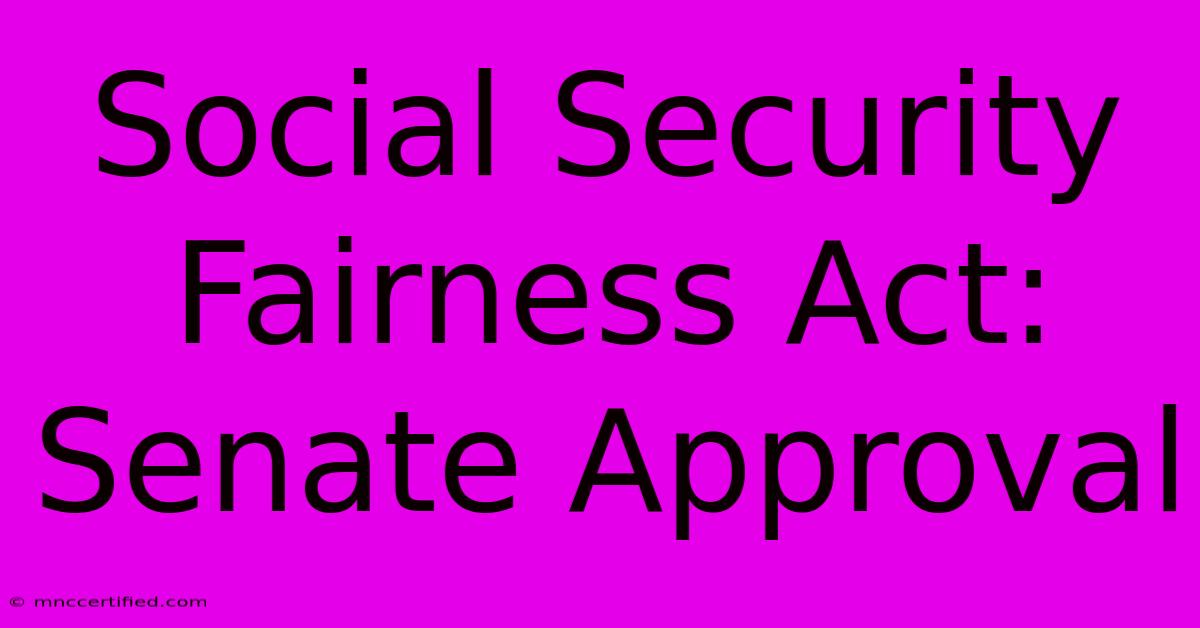Social Security Fairness Act: Senate Approval

Table of Contents
Social Security Fairness Act: Senate Approval – A Deep Dive
The Social Security Fairness Act, aiming to rectify perceived inequities in the Social Security system, has recently garnered significant attention, particularly with discussions surrounding Senate approval. This article delves into the core tenets of the Act, explores the arguments for and against its passage, and examines its potential impact on millions of Americans.
What is the Social Security Fairness Act?
The Social Security Fairness Act primarily focuses on addressing the financial penalties faced by federal employees and other public servants who switched from a traditional pension system to Social Security. Currently, these individuals often experience a reduction in their Social Security benefits due to a formula that doesn't fully account for their years of government service. The Act seeks to eliminate or mitigate these penalties, ensuring fairer treatment compared to their private-sector counterparts. This means fairer benefit calculations for those who dedicated their careers to public service.
Key Provisions of the Act:
- Elimination of Windfall Elimination Provision (WEP): The WEP significantly reduces Social Security benefits for individuals who also received a pension from government work. The Act seeks to abolish this provision entirely.
- Mitigation of the Government Pension Offset (GPO): Similar to the WEP, the GPO reduces spousal or survivor benefits for those with government pensions. The Act proposes significant changes to lessen this impact.
- Impact on Federal Retirees and Public Servants: The primary beneficiaries of this Act are federal employees, teachers, firefighters, and other public servants who contributed to Social Security during their careers. This includes millions of retirees and current employees relying on the system for retirement income.
Arguments For and Against Senate Approval
The Social Security Fairness Act has generated substantial debate within the Senate. Understanding the arguments on both sides is crucial to assessing its potential impact.
Arguments in Favor:
- Equity and Fairness: Proponents argue the Act addresses a long-standing injustice, ensuring fair treatment for public servants who contributed to Social Security throughout their careers. It's about equal treatment under the law.
- Economic Benefits for Retirees: Passage would provide a significant financial boost for many retirees, improving their quality of life during retirement and reducing financial strain.
- Attracting and Retaining Public Servants: A fairer system could encourage more individuals to pursue careers in public service, particularly those concerned about retirement security.
Arguments Against:
- Increased Costs: Critics argue the Act would significantly increase the cost of the Social Security system, potentially requiring higher taxes or benefit reductions for other beneficiaries to maintain solvency. This represents a concern about the financial sustainability of Social Security.
- Complexity of Implementation: Implementing the changes could prove complex and costly, requiring significant administrative changes within the Social Security Administration (SSA).
- Potential for Unintended Consequences: Opponents express concern about potential unforeseen effects on the broader Social Security system, possibly impacting benefit levels for other groups.
The Path to Senate Approval and Beyond
The Act's journey through the Senate is subject to several factors, including bipartisan support, committee hearings, and floor debates. Securing a majority vote is paramount for passage. Even after Senate approval, the bill must also pass through the House of Representatives before it can be signed into law by the President.
The Importance of Public Engagement:
Public engagement plays a vital role in influencing the decision-making process. Contacting your Senators and Representatives to express your views on the Social Security Fairness Act is crucial to ensuring your voice is heard. Advocacy and public pressure can significantly impact the legislative outcome.
Conclusion: A Fairer Future for Public Servants?
The Social Security Fairness Act represents a significant opportunity to address long-standing inequities within the Social Security system. While concerns remain regarding cost and implementation, the potential benefits for millions of public servants and their families are substantial. The Senate's decision on this Act will have a profound and lasting impact on the financial well-being of numerous Americans. The ongoing debate highlights the complexities of social security reform and the need for comprehensive solutions that balance fairness and fiscal responsibility. The future of the Act remains uncertain, but its consideration marks a crucial step in the ongoing conversation about strengthening and modernizing Social Security for all.

Thank you for visiting our website wich cover about Social Security Fairness Act: Senate Approval. We hope the information provided has been useful to you. Feel free to contact us if you have any questions or need further assistance. See you next time and dont miss to bookmark.
Featured Posts
-
Rickey Henderson Dies Remembering As Great
Dec 22, 2024
-
Ravens Steelers Game Where To Watch Live
Dec 22, 2024
-
4 0 Win For Newcastle Over Ipswich
Dec 22, 2024
-
He Looked Like Andrew Garfield Blind Date
Dec 22, 2024
-
Luke Littler Game Time Odds Prediction
Dec 22, 2024